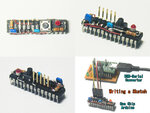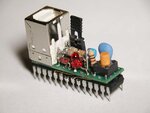mahesXtremeEngineering
Advanced Member level 4

What is the need to use an Arduino instead of a microcontroller system with AVR controller.. which will make the system more compact.
Follow along with the video below to see how to install our site as a web app on your home screen.
Note: This feature may not be available in some browsers.







Does Arduino support AVR C.




What is the need to use an Arduino instead of a microcontroller system with AVR controller.. which will make the system more compact.




I'm nor sure what the OP meant by "more compact", was it the code size or some other parameter.

I meant the physical size of the system.
Other than size, in Arduino definite ports of the AVR is already set for input or output. In a simple AVR we can adjust this and make the uC perfect to the particular application.
Hence an AVR alone is more flexible.

Yes, nothing more compact than a stand alone MCU. Nothing more flexible than pure old fashioned C (we are not talking about assembly right?). Also cheaper constructions are made with stand alone MCUs.mahesXtremeEngineering said:I meant the physical size of the system.



can I program it using the normal AVR tools?
In other words, did they modify it so that it only works with arduino stuff now?
